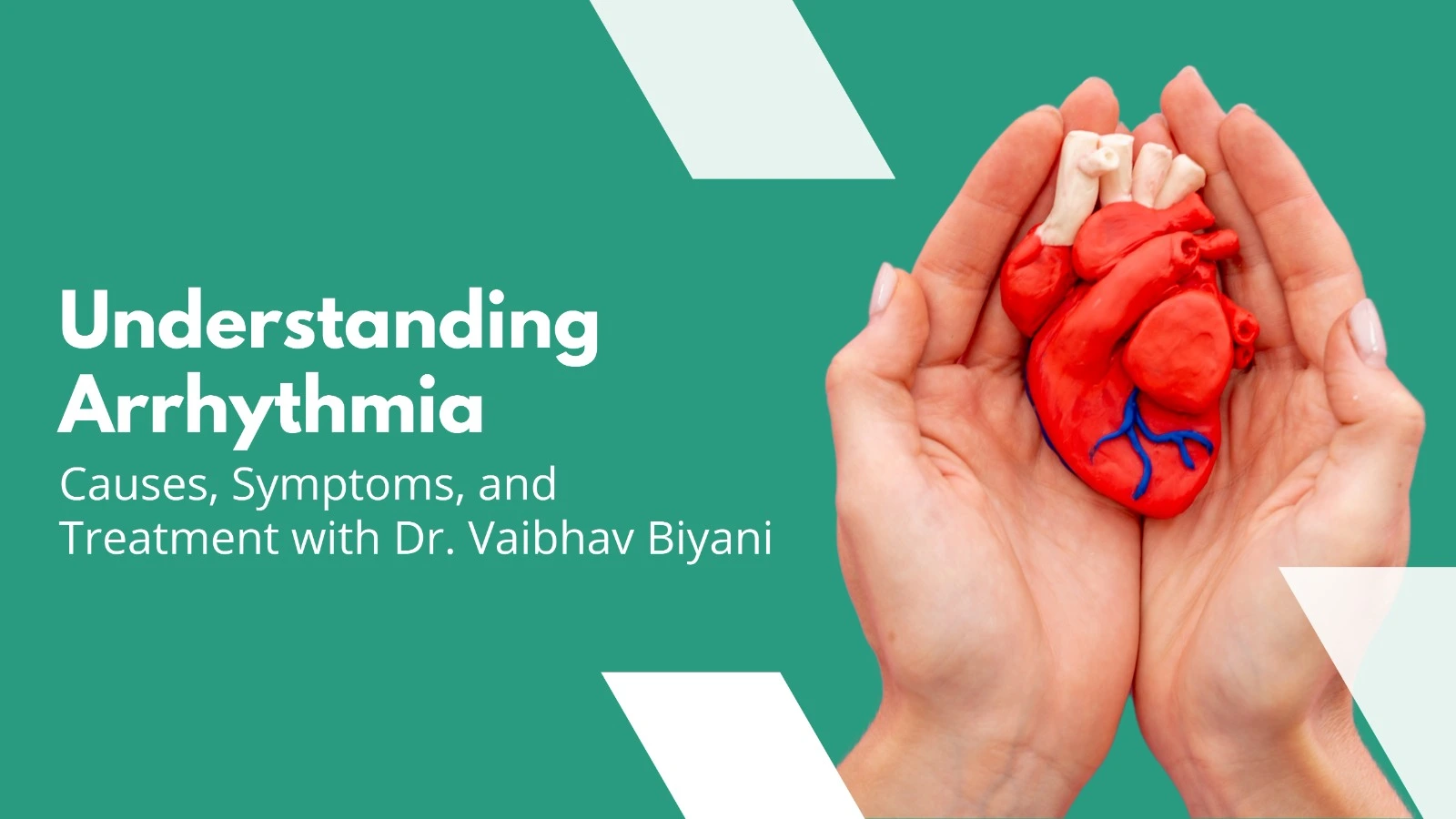Our Links
Contact Us
Chamber 4, Block-908, B-wing , Lokmat Bhavan, Lokmat Square, Nagpur, Maharashtra 440012
Copyright © 2024 DR. VAIBHAV BIYANI All rights reserved.
Design & Marketed by DGTurn

The human heart beats at a steady rhythm to keep us alive. However, when this rhythm becomes irregular—either too fast, too slow, or erratic—it is called an arrhythmia. While some arrhythmias are harmless, others can lead to severe complications, including stroke and heart failure.
Dr. Vaibhav Biyani, a leading cardiologist, emphasizes the importance of early detection and proper management of arrhythmias to prevent serious health risks. In this article, we will explore the causes, symptoms, and treatment options for arrhythmia.
What Is Arrhythmia?
Arrhythmia is a condition where the heart beats irregularly due to electrical signal disruptions. A normal resting heart rate is between 60-100 beats per minute (bpm). When the heart rate is outside this range, it falls into one of the following categories:
✅ Tachycardia – Heart rate above 100 bpm (too fast)
✅ Bradycardia – Heart rate below 60 bpm (too slow)
✅ Irregular Heartbeats – Skipped beats, extra beats, or abnormal rhythm patterns
While occasional irregular beats are common and usually harmless, frequent or persistent arrhythmias may indicate an underlying issue.
Causes of Arrhythmia
Several factors can cause arrhythmias, ranging from lifestyle choices to medical conditions. Here are some of the most common causes:
🔹 Heart Disease – Coronary artery disease, heart attacks, or high blood pressure can disrupt electrical signals.
🔹 Electrolyte Imbalance – Low levels of potassium, calcium, or magnesium affect heart function.
🔹 Excessive Caffeine or Alcohol – Stimulants can trigger irregular heartbeats.
🔹 Stress and Anxiety – Increased adrenaline levels can cause palpitations.
🔹 Thyroid Disorders – An overactive or underactive thyroid affects heart rhythm.
🔹 Sleep Apnea – Interrupted breathing during sleep can lead to arrhythmias.
Symptoms of Arrhythmia
Many people with mild arrhythmia may not notice symptoms. However, in more severe cases, the following signs may occur:
🚨 Common Symptoms:
✔️ A fluttering or racing heartbeat (palpitations)
✔️ Slow heartbeat or pauses between beats
✔️ Dizziness or lightheadedness
✔️ Shortness of breath
✔️ Chest pain or discomfort
✔️ Fainting (syncope)
If you experience any of these symptoms, especially chest pain or fainting, seek immediate medical attention.
Types of Arrhythmia
Arrhythmias come in different forms, each with its own set of risks:
1️⃣ Atrial Fibrillation (AFib): The most common arrhythmia, where the upper chambers (atria) beat irregularly. It increases the risk of stroke.
2️⃣ Ventricular Tachycardia: A fast heartbeat that originates in the ventricles. It can be life-threatening if prolonged.
3️⃣ Bradycardia: Slow heart rate that may cause dizziness or fatigue.
4️⃣ Premature Heartbeats: Extra beats that feel like skipped or irregular heartbeats.
How Is Arrhythmia Diagnosed?
To accurately diagnose arrhythmia, Dr. Vaibhav Biyani may recommend the following tests:
🩺 Electrocardiogram (ECG/EKG): Measures the heart’s electrical activity.
🩺 Holter Monitor: A wearable device that records heart activity for 24-48 hours.
🩺 Echocardiogram: Uses ultrasound to check heart structure and function.
🩺 Stress Test: Evaluates heart rhythm during physical activity.
🩺 Electrophysiology Study (EPS): Identifies abnormal electrical pathways in the heart.
Treatment Options for Arrhythmia
Treatment depends on the type and severity of the arrhythmia. Here are some of the most effective methods:
🏃♂️ Exercise regularly (as recommended by a doctor).
🥗 Eat a balanced diet rich in potassium and magnesium.
❌ Limit caffeine, alcohol, and smoking.
🧘♂️ Manage stress with yoga and meditation.
💊 Antiarrhythmic drugs help restore normal heart rhythm.
💊 Blood thinners (anticoagulants) reduce the risk of stroke in AFib patients.
⚡ Cardioversion: A controlled electric shock restores normal rhythm.
🩺 Catheter Ablation: Destroys abnormal heart tissue causing arrhythmia.
🫀 Pacemaker: A small device that helps regulate slow heartbeats.
⚡ Implantable Cardioverter Defibrillator (ICD): Monitors and corrects life-threatening arrhythmias.
Can Arrhythmia Be Prevented?
While some arrhythmias are genetic, many can be prevented with heart-healthy habits:
💖 Regular Checkups: Monitor blood pressure and cholesterol.
🥦 Healthy Diet: Focus on heart-friendly foods (fruits, vegetables, lean protein).
🏋️♂️ Physical Activity: Stay active to improve heart function.
🚫 Avoid Triggers: Reduce caffeine, alcohol, and stress.
Dr. Vaibhav Biyani stresses that early detection and management can significantly reduce the risk of complications.
When to See a Cardiologist?
If you experience frequent palpitations, dizziness, or shortness of breath, don’t ignore it. Consult Dr. Vaibhav Biyani for a thorough evaluation. Early intervention can prevent serious heart conditions and improve quality of life.
Book an Appointment Today!
Your heart health matters. If you or a loved one are experiencing symptoms of arrhythmia, schedule a consultation with Dr. Vaibhav Biyani for expert diagnosis and treatment.